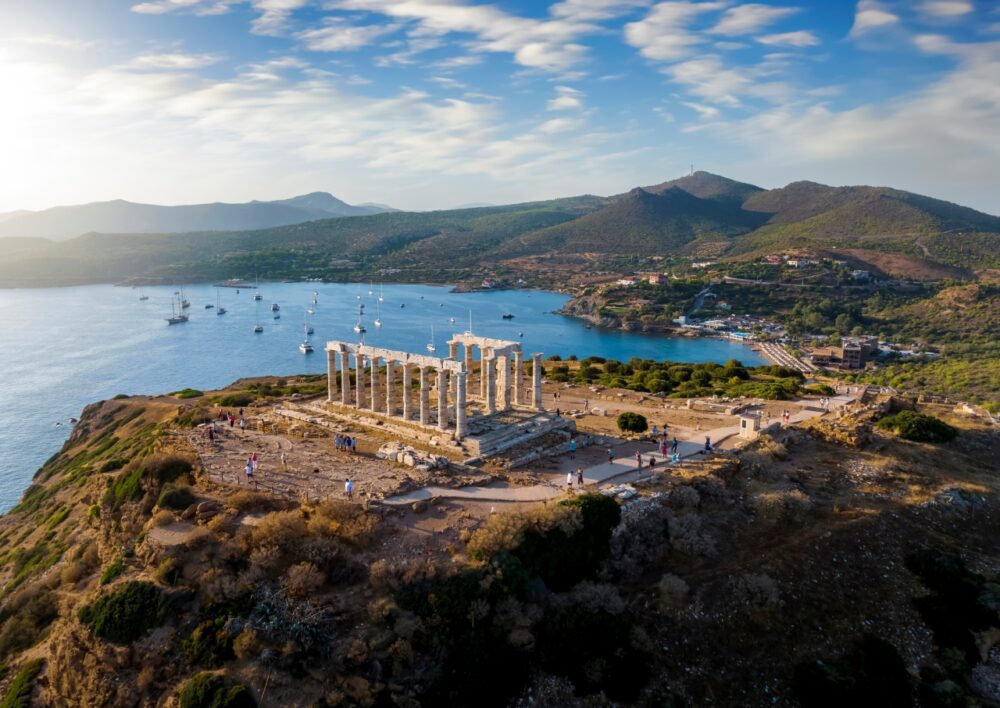
Is Athens worth visiting? Absolutely! The first time I visited Athens, I was blown away by the sheer depth of history around every corner. Standing atop the Acropolis and gazing at the Parthenon, it was hard to believe I was in the birthplace of Western civilisation. Yet, Athens is more than just a living museum—it’s a buzzing, modern city with vibrant neighbourhoods, incredible food, and a unique energy that’s impossible to resist.
As the capital of Greece, Athens is a city that effortlessly combines ancient landmarks with contemporary culture. From iconic sites like the Acropolis and the Temple of Olympian Zeus to the lively streets of Monastiraki and the trendy vibes of Psiri, Athens has something for everyone. Add in mouthwatering Greek cuisine, bustling markets, and a warm Mediterranean climate, and you’ve got a city that delivers an unforgettable travel experience. But is Athens worth visiting for you?
In this blog post, we’ll uncover the top 10 reasons why Athens should be on your travel list, from its world-famous historical sites to its thriving local culture. Plus, we’ll share travel tips to help you make the most of your time in this legendary city. Keep reading, and you’ll see why Athens is one of Europe’s most fascinating destinations.
Table of Contents
Pros – Reasons You Should Visit Athens
1. A City Steeped in Ancient History and Mythology

Athens is one of the most historically significant cities in the world, often referred to as the cradle of Western civilisation. With a history stretching back over 3,000 years, the city is filled with ancient ruins, archaeological sites, and fascinating stories from Greek mythology.
Walking through Athens felt like stepping into a history book. The Acropolis, with the iconic Parthenon towering above the city, is a breathtaking sight, and visiting landmarks like the Temple of Olympian Zeus and the Ancient Agora gave me a real sense of the city’s past. Whether you’re a history enthusiast or just curious about the ancient world, Athens is an extraordinary place to explore.
2. The Acropolis and Its Breathtaking Views

No visit to Athens is complete without seeing the Acropolis, the city’s most famous landmark. This ancient citadel sits on a rocky hill overlooking Athens and is home to some of Greece’s most significant historical sites, including the Parthenon, the Erechtheion, and the Temple of Athena Nike.
I visited early in the morning to avoid the crowds and the heat, and the experience was unforgettable. The climb to the top was rewarded with panoramic views of the entire city, stretching all the way to the Aegean Sea. Seeing the Parthenon up close, with its impressive Doric columns and rich history, was one of the highlights of my trip.
3. A Vibrant and Lively Street Life
Athens is a city that never feels dull, with bustling streets, lively squares, and a mix of ancient ruins and modern cafés blending together in a fascinating way. The city’s energy is infectious, and there’s always something happening, whether it’s a street performance, a lively market, or a group of locals enjoying a coffee outdoors.
I spent an afternoon wandering through Monastiraki Square, where the mix of flea markets, historic buildings, and street musicians created an electric atmosphere. Later, I relaxed in a café in the trendy neighbourhood of Psiri, where locals gathered to chat and enjoy the sunshine. Athens is a city that feels alive at all hours, making it a fantastic place to experience Greek culture.
4. Delicious Greek Cuisine with Authentic Flavours
Greek food is one of the highlights of visiting Athens, with its emphasis on fresh ingredients, bold flavours, and traditional recipes passed down through generations. Whether you’re enjoying a simple souvlaki from a street vendor or a multi-course meal in a taverna, the food in Athens is guaranteed to impress.
I had some of the best meals of my trip in small, family-run restaurants, where I tried classics like moussaka, grilled lamb, and freshly caught seafood. One of my favourite experiences was sitting at a taverna in Plaka, sipping ouzo while enjoying plates of feta-drizzled salads and warm pita with tzatziki. The variety and quality of food in Athens make it a dream destination for food lovers.
5. A Great Café Culture and an Exciting Nightlife Scene
Athens has a fantastic café culture, with locals spending hours enjoying a coffee while socialising or watching the world go by. Greek coffee is an experience in itself, whether you prefer a traditional strong brew or a refreshing freddo espresso on a hot day.
At night, the city transforms, with a mix of rooftop bars, lively bouzouki music venues, and underground clubs offering something for everyone. I visited a rooftop bar in the Thissio district, where I enjoyed a cocktail with a stunning view of the illuminated Acropolis. Unlike some European capitals where nightlife is restricted to certain areas, Athens offers a diverse and vibrant scene throughout the city.
6. Stunning Beaches and the Aegean Coast Are Nearby
One of the great things about Athens is its proximity to the sea. While it’s not a traditional beach destination, the Athenian Riviera is just a short drive or tram ride away, offering beautiful coastal escapes.
I took a short trip to Vouliagmeni Beach, where I found crystal-clear waters and golden sand just 30 minutes from the city centre. Another highlight was visiting Lake Vouliagmeni, a natural thermal lake surrounded by cliffs, perfect for a relaxing swim. If you have extra time, a day trip to the nearby islands of Aegina or Hydra offers an even more scenic coastal experience.
7. A City That Blends Ancient and Modern Culture
While Athens is famous for its ancient history, it is also a modern and dynamic city with a thriving arts and cultural scene. The city is filled with contemporary art galleries, independent theatres, and creative spaces that showcase the new generation of Greek talent.
I visited the Stavros Niarchos Foundation Cultural Centre, a stunning modern complex that houses the National Library and the Greek National Opera. The contrast between this sleek, modern design and the ancient ruins elsewhere in the city was fascinating. Athens is not just a place to learn about the past—it’s also a city that embraces the future.
8. Plenty of Affordable Accommodation and Dining Options
Compared to other European capitals, Athens is relatively affordable, with great-value accommodation, food, and attractions. While prices have risen in recent years, it’s still possible to experience the city on a budget without sacrificing quality.
I stayed in a charming guesthouse in the Koukaki district, just a short walk from the Acropolis, for a fraction of what a similar location would cost in cities like Paris or London. Street food like souvlaki and gyros were both delicious and inexpensive, making it easy to eat well without overspending. Whether you’re a budget traveller or looking for luxury, Athens offers something for every price range.
9. Fascinating Museums Covering Thousands of Years of History
Athens is home to some of the best museums in Greece, offering a deep dive into the country’s rich history and culture. From world-famous archaeological collections to unique art galleries, the city’s museums are a must-visit.
I spent hours exploring the Acropolis Museum, which houses incredible artefacts from the Parthenon and other ancient sites. The National Archaeological Museum was another highlight, with its impressive collection of Greek statues, gold treasures, and ancient pottery. Even smaller museums, like the Benaki Museum, offered fascinating insights into Greek culture from antiquity to modern times.
10. Stunning Sunsets with Unforgettable Views

Athens offers some of the best sunset views in Europe, with incredible vantage points where you can watch the sun dip behind the mountains and sea. Whether you’re at a rooftop bar, a hilltop viewpoint, or even the Acropolis, the sunsets in Athens are truly spectacular.
I climbed to the top of Lycabettus Hill just before sunset, and the panoramic view over the city was breathtaking. The sky turned shades of pink and orange, with the Parthenon glowing in the golden light. Another fantastic spot is the Temple of Poseidon at Cape Sounion, where you can watch the sunset over the Aegean Sea with an ancient temple as your backdrop.
Cons – Things to Consider When Visiting Athens
1. Traffic Congestion and Chaotic Driving Can Be Overwhelming
Athens is notorious for its heavy traffic, and navigating the city by car can be stressful due to aggressive driving, frequent congestion, and a lack of clear lane discipline. Even as a pedestrian, crossing the road can sometimes feel like an adventure, as not all drivers stop at zebra crossings.
I found that even short taxi rides could take much longer than expected due to traffic jams, particularly in the city centre and around major landmarks. The metro system is a more reliable way to get around, but in some areas, public transport options are limited, making walking or dealing with unpredictable traffic unavoidable. If you’re planning to explore Athens, patience is essential when it comes to getting from one place to another.
2. The Summer Heat Can Be Unbearable for Sightseeing
Athens experiences scorching summers, with temperatures often exceeding 35°C (95°F) in July and August. Combined with the city’s concrete-heavy landscape and limited shade, the heat can make sightseeing exhausting, particularly at outdoor sites like the Acropolis.
I visited in August and quickly realised that climbing up to the Acropolis in the middle of the day was a mistake. The heat was intense, and there was little to no shelter from the sun. If you’re visiting Athens in the summer, it’s best to explore in the early morning or late afternoon, stay hydrated, and take frequent breaks in air-conditioned cafés or museums. Alternatively, travelling in spring or autumn offers a far more comfortable experience.
3. Air Pollution and Smog Can Affect the Atmosphere
Due to heavy traffic and the city’s geography, Athens can suffer from air pollution, particularly during the hot summer months. The combination of vehicle emissions and heat can create a haze over the city, sometimes affecting visibility and air quality.
On certain days, I noticed a layer of smog hanging over the city, which made the views from higher points like Lycabettus Hill less clear. While it didn’t impact my overall experience too much, travellers with respiratory issues might find it uncomfortable, especially in peak summer. If you’re sensitive to pollution, checking air quality levels before heading out for the day can be helpful.
4. Some Areas of the City Feel Run-Down or Unsafe
While Athens has beautiful historic districts, there are also areas that feel less well-maintained, with graffiti-covered buildings, abandoned properties, and signs of urban decline. Certain neighbourhoods, particularly around Omonia Square and parts of Exarchia, have a reputation for petty crime and can feel a little uneasy, especially at night.
I walked through some of these areas during the day and felt generally safe, but I did notice a stark contrast between the lively, tourist-friendly parts of the city and the less polished sections. While most of Athens is perfectly fine to explore, it’s best to research neighbourhoods in advance and take basic safety precautions, such as avoiding poorly lit streets late at night.
5. Crowds and Long Queues at Major Attractions
Athens attracts millions of visitors every year, and its most famous sites, like the Acropolis and the Acropolis Museum, can become extremely crowded, especially in peak season. Long queues, packed tour groups, and limited space at certain landmarks can make it difficult to fully appreciate the historical sites.
When I visited the Acropolis, even though I arrived early, it was already filled with tourists, making it challenging to take in the details without being jostled by crowds. In summer, the combination of heat and crowds can be particularly overwhelming. Booking tickets in advance, arriving as early as possible, and visiting lesser-known archaeological sites can help make the experience more enjoyable.
When to Visit Athens
The best times to visit Athens are spring (March to May) and autumn (September to November), when the weather is mild, the skies are clear, and the city is alive with festivals and cultural events. These shoulder seasons are perfect for exploring Athens’ ancient ruins and outdoor cafes without the heat of summer or the winter chill. Summer (June to August) is peak tourist season, with long, sunny days ideal for sightseeing and day trips to nearby islands, though it can get very hot and crowded. Winters in Athens are mild, making it a quieter and more budget-friendly option for exploring the city’s indoor museums and cosy tavernas.
How to Get to Athens
Athens International Airport (ATH), also known as Eleftherios Venizelos, is Greece’s largest airport and well-connected to major cities worldwide via airlines like Aegean Airlines, Lufthansa, and Emirates, as well as budget carriers like Ryanair and easyJet. From the airport, the Metro Line 3 (blue line) takes about 40 minutes to reach the city centre. Alternatively, express buses run 24/7 and connect the airport to Syntagma Square and Piraeus port. Taxis and ride-sharing services are available but more expensive. Athens is also a major hub for domestic travel, with ferries departing from Piraeus to popular Greek islands.
Where to Stay in Athens
Athens has a variety of neighbourhoods catering to every type of traveller:
- Luxury: Plaka – The historic heart of Athens, close to the Acropolis and filled with charming streets. Stay at Electra Palace Athens or AthensWas Design Hotel for luxurious comfort and stunning rooftop views.
- Mid-range: Monastiraki – Known for its vibrant flea market and central location, this area offers affordable charm. Try 360 Degrees Hotel or A for Athens, both with fantastic rooftop terraces overlooking the Acropolis.
- Budget: Exarchia – A bohemian neighbourhood popular with artists and students, offering affordable options like City Circus Hostel or Athens Quinta, perfect for budget-conscious travellers seeking a unique local vibe.
Getting Around Athens
Athens is well-connected with an efficient public transport system that includes the metro, buses, trams, and trolleybuses. The Athens Metro is particularly convenient for reaching major sights like the Acropolis, Syntagma Square, and Piraeus port. A 24-hour transport pass is a great value for unlimited travel. Taxis are affordable by European standards but can get stuck in traffic, so they’re best for short distances. For a scenic alternative, rent a bike or use the city’s bike-sharing services to explore areas like the National Garden or the pedestrianised streets of Plaka. Walking is also enjoyable in the compact historic centre.
How Long to Spend in Athens
Three to four days is ideal for exploring Athens’ highlights, including the Acropolis, Parthenon, Ancient Agora, and National Archaeological Museum. With this amount of time, you’ll also have the chance to wander through Plaka and Monastiraki, sample Greek cuisine, and enjoy the city’s nightlife. With an extra day, consider a day trip to Cape Sounion to see the Temple of Poseidon or to nearby Delphi, one of Greece’s most famous archaeological sites. If you’re heading to the Greek islands, a few days in Athens is the perfect start to your adventure.
Conclusion
So, is Athens worth visiting? Absolutely! With its iconic ancient ruins, dynamic modern culture, and incredible food, Athens offers a travel experience that’s truly one of a kind. Highlights like the Acropolis, Plaka’s charming streets, and the vibrant Athens Riviera make it a must-visit. While the city can be busy and a bit chaotic at times, its charm and history more than make up for it. If you’re ready to immerse yourself in the cradle of Western civilisation, start planning your trip to Athens today—you won’t regret it!
